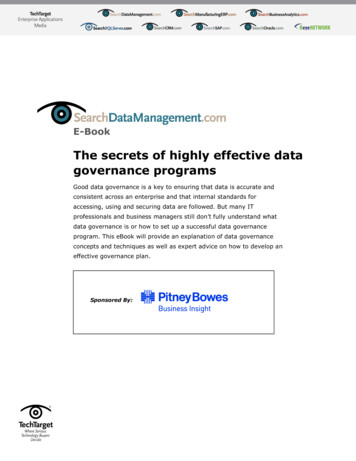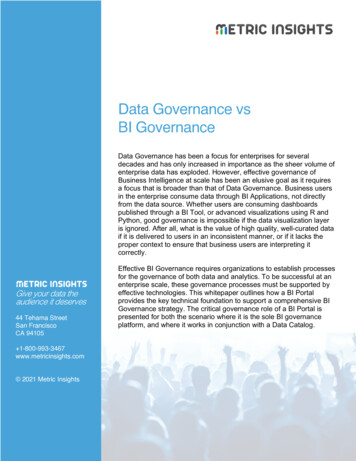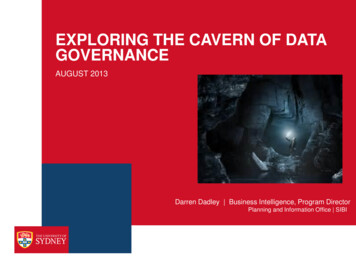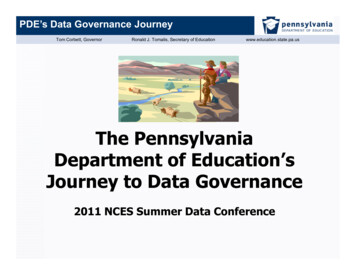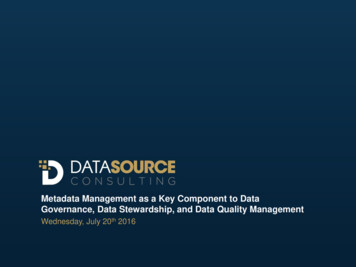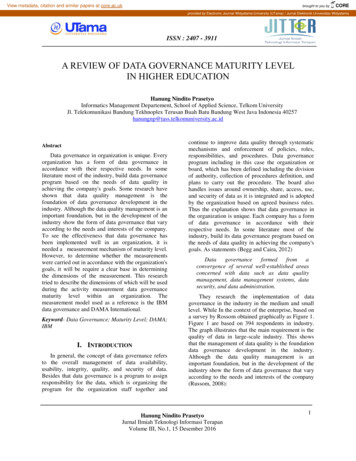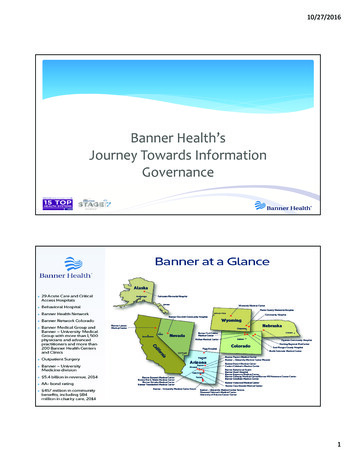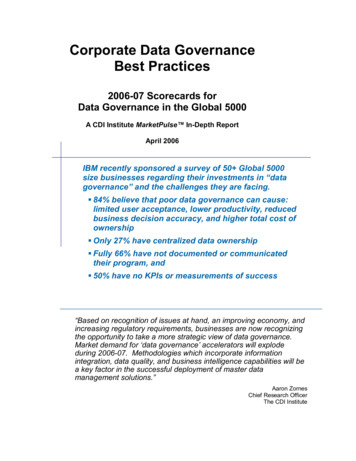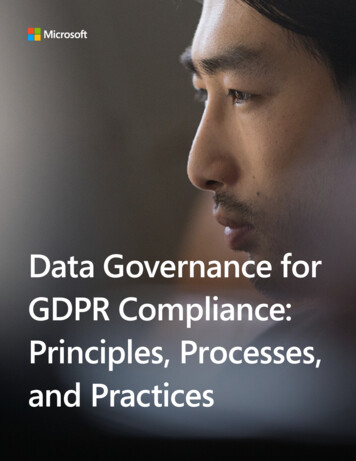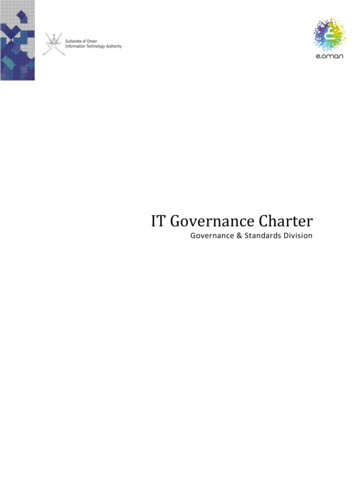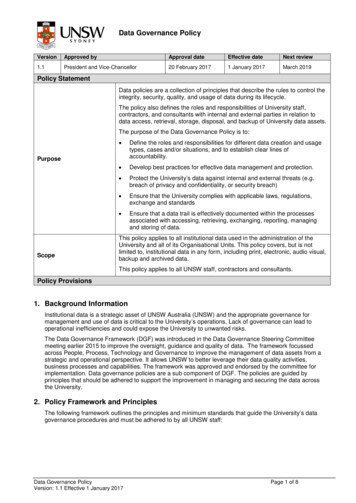
Transcription
Data Governance PolicyVersionApproved byApproval dateEffective dateNext review1.1President and Vice-Chancellor20 February 20171 January 2017March 2019Policy StatementData policies are a collection of principles that describe the rules to control theintegrity, security, quality, and usage of data during its lifecycle.The policy also defines the roles and responsibilities of University staff,contractors, and consultants with internal and external parties in relation todata access, retrieval, storage, disposal, and backup of University data assets.The purpose of the Data Governance Policy is to: Define the roles and responsibilities for different data creation and usagetypes, cases and/or situations, and to establish clear lines ofaccountability. Develop best practices for effective data management and protection. Protect the University’s data against internal and external threats (e.g.breach of privacy and confidentiality, or security breach) Ensure that the University complies with applicable laws, regulations,exchange and standards Ensure that a data trail is effectively documented within the processesassociated with accessing, retrieving, exchanging, reporting, managingand storing of data.PurposeScopeThis policy applies to all institutional data used in the administration of theUniversity and all of its Organisational Units. This policy covers, but is notlimited to, institutional data in any form, including print, electronic, audio visual,backup and archived data.This policy applies to all UNSW staff, contractors and consultants.Policy Provisions1. Background InformationInstitutional data is a strategic asset of UNSW Australia (UNSW) and the appropriate governance formanagement and use of data is critical to the University’s operations. Lack of governance can lead tooperational inefficiencies and could expose the University to unwanted risks.The Data Governance Framework (DGF) was introduced in the Data Governance Steering Committeemeeting earlier 2015 to improve the oversight, guidance and quality of data. The framework focussedacross People, Process, Technology and Governance to improve the management of data assets from astrategic and operational perspective. It allows UNSW to better leverage their data quality activities,business processes and capabilities. The framework was approved and endorsed by the committee forimplementation. Data governance policies are a sub component of DGF. The policies are guided byprinciples that should be adhered to support the improvement in managing and securing the data acrossthe University.2. Policy Framework and PrinciplesThe following framework outlines the principles and minimum standards that guide the University’s datagovernance procedures and must be adhered to by all UNSW staff:Data Governance PolicyVersion: 1.1 Effective 1 January 2017Page 1 of 8
Figure 1.0: Data Policy Framework2.1. Governance and OwnershipData Governance RoleData Governance ResponsibilityData CustodianUNSW, rather than any individual or Organisational Unit, is the Custodianof the data and any information derived from the data.Chief Data OfficerThe Chief Data Officer is responsible for the overall management of theUniversity’s Data and Information GovernanceData Governance SteeringCommitteeThe Data Governance Steering Committee is responsible for the overallmanagement of the University’s Data Governance.Data ExecutiveA Data Executive supported by a Data Owner has the responsibility for themanagement of data assigned within their portfolio.Data OwnerData Owners are delegated by a Data Executive, and are responsible forensuring effective local protocols are in place to guide the appropriate useof their data asset. Access to, and use of, institutional data will generally beadministered by the appropriate Data Owner. Data Owners (or a delegatedData Steward) are also responsible for ensuring that all legal, regulatory,and policy requirements are met in relation to the specific data orinformation asset. This includes responsibility for the classification of datain accordance with the Data Classification Standard.Data Owners are responsible for ensuring that data conforms to legal,regulatory, exchange, and operational standards.The Data Owner must ensure the process for the administration of data isin accordance with the Data Management Life Cycle (refer Appendix 1).Data StewardsEvery data area must have one or more Data Stewards, who areresponsible for the quality and integrity, implementation and enforcement ofdata management within their Division, Faculty, Centre or research project.The Data Steward will classify and approve the access, under delegationfrom a Data Owner, based upon the appropriateness of the User’s role andthe intended use. Where necessary, approval from the Data Executive/DataOwner may be required prior to authorisation of accessData CreatorsData Creators are academic researchers who create original research dataduring the course of an academic appointment with UNSW.Data Creators under Ownership and Responsibility category (referAppendix 2) are People who are responsible for the Creation andOwnership of research data and primary materials. Original research dataand primary materials generated in the conduct of research at theUniversity is owned and retained by the University, subject to anycontractual, statutory, ethical, or funding body requirements. Researchersare permitted to retain a copy of the research data and primary materialsData Governance PolicyVersion: 1.1 Effective 1 January 2017Page 2 of 8
Data Governance RoleData Governance Responsibilityfor future use, subject to any contractual, statutory, ethical or funding bodyrequirements.Data SpecialistsData Specialists are business and technical subject matter experts inrelation to the data or information asset. The Subject Matter Experts(SME’s) under Management and Operations category (refer Appendix 2)are Business or Information Technology specialists who will be responsiblefor providing ongoing support to UNSW Operational systems, data orinformational assets.2.2. Quality and Integrity: Data Creators and Data Users must ensure appropriate procedures are followed to uphold thequality and integrity of the data they access Data records must be kept up-to-date throughout every stage of the business workflow (Universityoperations) and in an auditable and traceable manner. Data should only be collected for legitimateuses and to add value to the University. Extraction, manipulation and reporting of data must be doneonly to perform University business, including teaching or research. Where appropriate, before any data (other than publically available data) is used or shared outsidethe University, verification with the Data Steward is required to ensure the quality, integrity andsecurity of data will not be compromised. Data shall be retained and disposed of in an appropriate manner in accordance with the University’sRecordkeeping Policy, Electronic Recordkeeping Policy and associated procedures under the StateRecords Act 1988 (NSW)2.3. Classification and Security: Staff, contractors and consultants should refer to the Data Classification Standard and the DataHandling Guideline for further information. Appropriate data security measures (see Data Classification Standard) must be adhered to at alltimes to assure the safety, quality and integrity of University data. Personal use of institutional data, including derived data, in any format and at any location, isprohibited. Records stored in an electronic format must be protected by appropriate electronic safeguardsand/or physical access controls that restrict access only to authorised user(s) Similarly, data in theUniversity Data repository (Databases etc.) must also be stored in a manner that will restrict accessonly to authorised user(s). This Policy applies to records in all formats (paper, digital or audio-visual) whether registered files,working papers, electronic documents, emails, online transactions, data held in databases or on tapeor disks, maps, plans, photographs, sound and video recordings, or microforms.2.4. Terms and Definitions The definition and terms used to describe different types of data should be defined consistently orreferred to the relevant Business Glossary of the University contained within the Collibra DataGovernance Centre.3. Policy ReviewThis Policy will be reviewed and updated every three (3) years from the approval date, or morefrequently if appropriate. In this regard, any staff members who wish to make any comments about thePolicy may forward their suggestions to the Responsible Officer.4. Further AssistanceAny staff member who requires assistance in understanding this Policy should first consult theirnominated supervisor who is responsible for the implementation and operation of these arrangements intheir work area. Should further assistance be needed, the staff member should contact the ResponsibleOfficer for clarification.Data Governance PolicyVersion: 1.1 Effective 1 January 2017Page 3 of 8
AccountabilitiesResponsible OfficerDirector, UNSW Planning & PerformanceContact OfficerChief Data Officer, UNSW Planning & PerformanceSupporting InformationLegislative ComplianceThis Policy supports the University’s compliance with the following legislation:NilData Classification StandardSupporting DocumentsData Handling GuidelineIT Security Policy – Information Security Management System (ISMS)IT Security StandardsCollibra Data Governance Centre: https://unsw.collibra.comData Classification StandardData Handling GuidelineRelated DocumentsElectronic Recordkeeping PolicyInformation Security Management SystemRecordkeeping PolicyUNSW Privacy Management PlanUNSW Risk Management FrameworkSuperseded DocumentsData Governance Policy, version 1.0 approved by the President and Vice-Chancellor onthe 11 March 2016.File Number2016/09756Definitions and AcronymsTo establish operational definitions and facilitate ease of reference, the following terms are defined:AccessThe right to read, copy, or query dataBusiness SMERefer to Data SpecialistBusiness/Division AreaData AreaA Data area is a term used to denote a subset of institutional data that is theresponsibility of a team including Data Owner and Data Stewards. This could include anentire IT system (e.g. Human Resources system) or an business area such as Identityand Access Management, or a Research project. It may include data that is theresponsibility of University Divisions, such as Finance, HR, Library, Students, etc. andResearch.Chief Data OfficerCDOSenior officer of UNSW responsible for Data and Information Governance.Data Governance PolicyVersion: 1.1 Effective 1 January 2017Page 4 of 8
The representation of facts, concepts or instructions in a formalised (consistent andagreed) manner suitable for communication, interpretation or processing by human orautomatic means. Typically comprised of numbers, words or images. The format andpresentation of data may vary with the context in which it is used.DataInstitutional DataData is not Information until it is used in a particular context for a particular purpose.(Office of the Australian Information Commissioner (OAIC), 2013)Data is typically considered to be conceptually at the lowest level of abstraction.In the context of this policy this term includes all institutional data including research,administrative, and learning and teaching artefacts.Data CreatorData Creators who will beare persons responsible for the Ownership of research dataand primary materials. Original research data and primary materials generated in theconduct of research at the University will be owned and retained by the University,subject to any contractual, statutory, ethical, or funding body requirements.Researchers are permitted to retain a copy of the research data and primary materialsfor future use, subject to any contractual, statutory, ethical or funding bodyrequirements.Data ExecutiveIs a Senior Executive with planning and decision-making authority for part or all ofUNSW’s institutional data. The Data Executives, as a group, are responsible foroverseeing the continuous improvement of the University’s data governance andmanagement.Data Governance roles andresponsibilitiesOutlines the access rights, roles and responsibilities of UNSW staff, contractors andconsultants in relation to the management and protection of data.Data Governance SteeringCommitteeDGSCIs a University wide committee, with members consisting of Data Executives, DataStewards and designated Data Userssenior academic and professional staff. TheDGSC has oversight of the Data Governance Program and is responsible for approvingendorsing the procedures related to the Data Governance Policy. The DGSC alsoassures appropriate data processes are used in all of the University’s data-drivendecisions.Data Management Life CycleRefers to the process for planning, creating, managing, storing, implementing,protecting, improving and disposing of all institutional data of the UniversityData OwnerHas operational responsibilities in assisting Data Stewards with day-to-day dataadministration activities; including, but is not limited to: develop, maintain, distribute,and secure institutional data. Data Owners are expected to have high-level knowledgeand expertise in the content of data within their responsible area. This role is also theorganizational Data Custodian. UNSW, rather than any individual or OrganisationalUnit, is the Custodian of the data and any information derived from the data.Data QualityQualityData SpecialistRefers to the validity, relevancy and currency of dataData Specialists are business and technical subject matter experts in relation to thedata or information asset. The Subject Matter Experts (SME’s) under Management andOperations category (refer Appendix 2) are Business or Information Technologyspecialists who will be responsible for providing ongoing support to UNSW Operationalsystems, data or informational assets.Every data area must have one or more Data Stewards, who are responsible for thequality and integrity, implementation and enforcement of data management within theirDivision, Faculty, Centre or research project.Data StewardThe Data Steward will classify and approve the access, under delegation from a DataOwner, based upon the appropriateness of the User’s role and the intended use. Wherenecessary, approval from the Data Executive/Data Owner may be required prior toauthorisation of accessIs a Member of the Executive who oversees the capture,maintenance and dissemination of data for a particular Organisational Unit. DataStewards are responsible for assuring the requirements of the Data Governance Policyand the Data Governance Procedures are followed within their Organisational UnitData Governance PolicyVersion: 1.1 Effective 1 January 2017Page 5 of 8
Is any staff member, contractor, consultant or authorised agent who accesses, inputs,amends, deletes, extracts, and analyses data in UNSW IT system to carry out their dayto-day duties. Data Users are not generally involved in the governance process, but areresponsible for the quality assurance of data. Appropriate security and approval isrequired from Data Stewards to maintain the quality and integrity of the Data.Anymember of the university community that has access to university data, and thus isentrusted with the protection of that data.Data UserInformation SecurityManagement SystemISMSIntegrity or data integrityIn response to UNSW Data Classification and Handling requirements, Tthe ISMSprovides Information Security governance and sets out people, process and technologyrelated controls to assure the confidentiality, integrity and availability of UNSW data. TheISMS is a response to UNSW Data Classification and Handling requirements.Moreoverrequirements. Moreover, the deployment and measurement of ISMS controlsprovides input into the risk management process enabling informed business decisions.Refers to the accuracy and consistency of data over its entire life-cycle.Management BoardThe senior executive team of the University.MBRecordInstitutional RecordRecordInstitutional RecordMetadata records stored in any digital formatMetadata records stored in any digital formatIs any document or other source ofinformation compiled, recorded or stored in written form or on film, or by electronicprocess, or in any other manner or by any other means.Source: State Records Act 1998 (NSW)Rrefers to the safety of University data in relation to the following criteria:SecurityAccess control; Authentication; Effective incident detection, reporting and solution;Physical and virtual security; and Change management and version control.ISMSInformation SecurityManagement SystemIn response to UNSW Data Classification and Handling requirements, the ISMS providesInformation Security governance and sets out people, process and technology relatedcontrols to assure the confidentiality, integrity and availability of UNSW data. Moreover,the deployment and measurement of ISMS controls provides input into the riskmanagement process enabling informed business decisions.Revision HistoryVersionApproved byApproval dateEffective dateSections modified1.0President and Vice-Chancellor11 March 20161 March 2016New Policy1.1President and Vice-Chancellor20 February 20171 January 2017Minor information managementamendmentData Governance PolicyVersion: 1.1 Effective 1 January 2017Page 6 of 8
APPENDIX 1 - DATA MANAGEMENT LIFE CYCLEData Management Life Cycle refers to the process for planning, creating, managing, storing,implementing, protecting, improving and disposing of all institutional data of UNSW.Figure 2.0 – Data Management LifecycleData Governance PolicyVersion: 1.1 Effective 1 January 2017Page 7 of 8
APPENDIX 2 - DATA GOVERNANCE ROLES AND RESPONSIBILITIESManagement and OperationsOwnership and ResponsibilityData Governance PolicyVersion: 1.1 Effective 1 January 2017Page 8 of 8
The Data Governance Framework (DGF) was introduced in the Data Governance Steering Committee meeting earlier 2015 to improve the oversight, guidance and quality of data. The framework focussed across People, Process, Technology and Governance to improve the management of data assets from a strategic and operational perspective.
